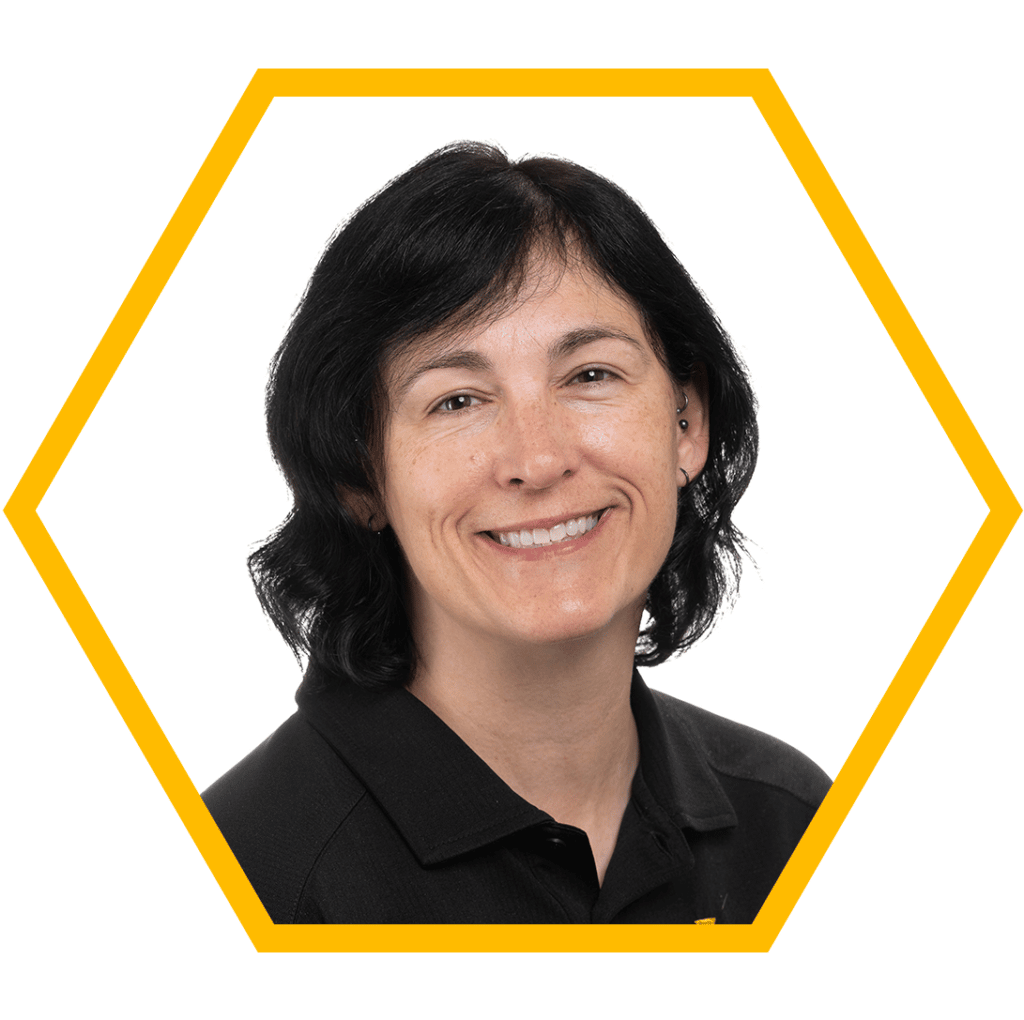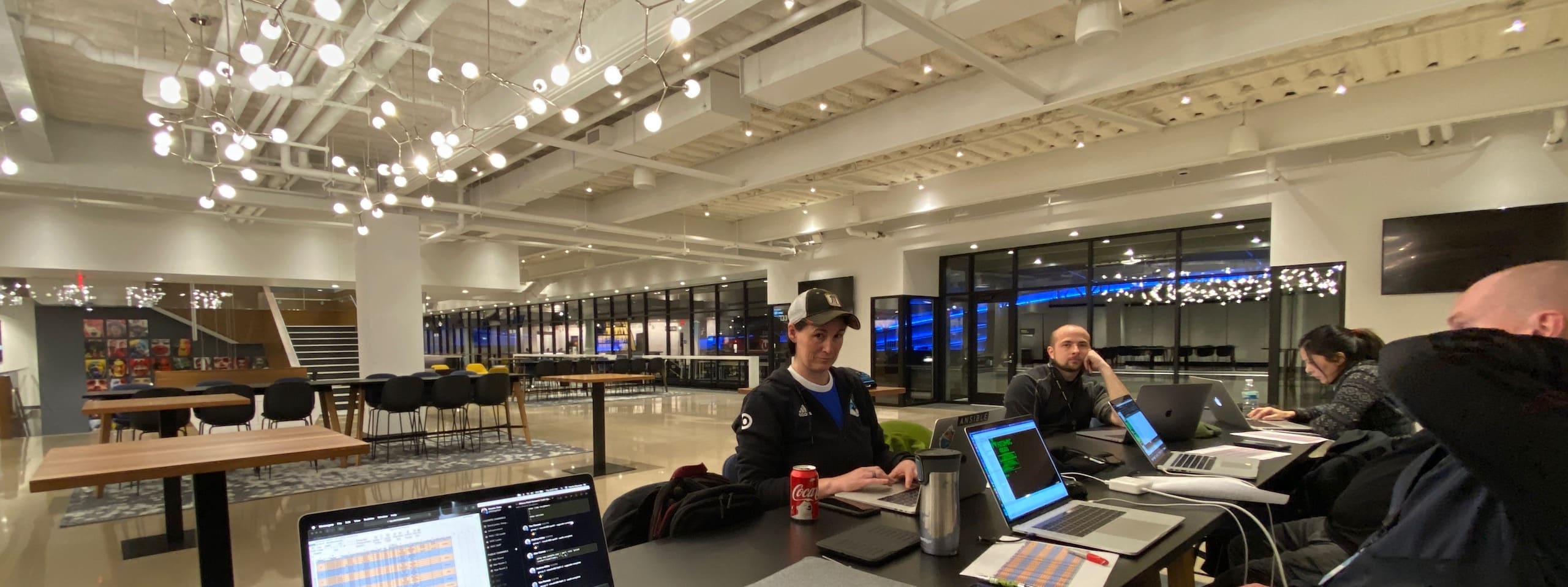Getting Curious About Technology: Andrea Aldes
Written by Mary Thomas
Andrea Aldes’s drive to understand how things work has fueled her success in the Information Technology field.
Currently, an Infrastructure Engineer at Atomic Data, Andrea’s passion for computers led to a career in the industry for the last twenty years. This same determination and drive to explore also supports her passions outside of work as a motorcyclist and hockey player. As Andrea shares, if you’re interested in trying something new but don’t know how to begin, start where you are with resources that are low-cost and low-commitment: you’ll be surprised by how far you can go.

Tell us about your career journey. How did you become interested in network engineering?
According to my mom, I was interested in computers as a little kid. As I got older, I sought out computer-related classes during summer school sessions. After I graduated from high school, I started off as a psychology major, but that didn’t really click with me. I went to a technical college for a two-year degree, and I was hired at my first job through that. Later on, I earned a four-year degree from St. Mary’s University in applied information technology, and I’ve been working in the field ever since.
What does your role as an Infrastructure Engineer entail and what interests you about it?
The role is very similar to a network engineer. We develop and oversee all of the networking for Atomic Data’s customers. We manage their firewalls, routers, switches, wireless systems, and everything in between. It’s constantly changing; there are always new products and features. It’s challenging but exciting to try to master it all and stay up to date. For example, when we’re helping our clients solve a challenge, there is a wide selection of equipment available and numerous ways we can combine that equipment to create that solution.
Tell us more about how you began your journey with Atomic Data.
Someone in my network worked at Atomic Data and thought I would be a good fit. I really love working here. It has been a big shift from working for a large corporation, where since you may not directly drive their profits, there can be an attitude that they’re stuck with you. At Atomic Data, since the business is structured around IT, I feel like my skills are valued.
Have you had an “aha” moment where you realized that you had found the right professional fit professional?
In IT, I know that it’s rare to leave college, build a career based on what you studied, and stay with it for a long time. At Atomic Data, there was something that felt right about it right from the beginning. It’s the first place I’ve worked where I really felt like they cared about me as a person. I’ve been part of the Atomic Data team for just over six years. There are many people who have been here longer than me; Atomic Data has a loyal core group of employees.
Tell us about your passions, both within and beyond your professional life.
My work passion is to figure everything out: I want to be able to do everything and know how everything works. If something is puzzling, I will dedicate time to watching videos, reading, or having someone else explain it to me. Within work, that’s what drives me: not just knowing how everything works, but how it all works together. I have two main passions outside of work. Over the winter, I play hockey, and in the summer, I have a motorcycle that I ride.
How did you get into motorcycling?
I’ve been riding for over twenty years. When I was a kid and would see people on motorcycles, I thought they looked so cool and like they were having a great time. When I started, you rarely ever saw a woman riding her motorcycle, but I wanted to do it, so I took the lessons and learned how to ride. It’s something that I’m really proud of. Women will talk to me and ask me about it, and they tell me that they don’t think they could ever learn how to ride a motorcycle. I tell them they can. Once you get going, it’s easy.
How long have you been playing hockey, and what do you love about it?
I started playing close to 12 years ago. Some other moms and I started playing because our sons played hockey together as kids. As moms, we were bringing our kids to the rinks, watching them have a great time, and getting a lot of exercise. One of the coaches started getting ice time at night and invited the moms to start playing. Over time, it started getting bigger as more moms started showing up, and it became more organized. Minnesota also has the biggest women’s hockey league in the world. One of my friends played on a team, and she invited me to join it. I can’t believe this all started from a group of moms watching their kids play. I love playing because it’s great exercise, and it’s so much fun. The teams are all women, and everyone on the teams knows each other. We’ll have a beer after the game and both teams will be there to hang out. It’s competitive but fun: when we’re on the ice, we’re definitely trying to win, but when we’re done, we’re friends. During games, our opponents will tell us we made a great shot. When someone on the other team falls down, we’ll help them up.
What does passion mean to you, not just in your personal life, but beyond as well?
It’s the feeling that I must do something. It’s the only way I can describe it. In my professional life, I absolutely must know how things work or I will think about it all the time until I do. At work, I spend some of my time studying for certifications related to different products we use. Many people think that with networking and computers, it’s cut-and-dry and there’s one way to do things, when there are gray areas in how things work. I appreciate knowing that I’m doing something the correct way, and understand how a product was meant to be used. When I’m trying to solve a problem, having insight into what the vendor intended can help me figure out alternative solutions. With hockey, passion is about wanting to be better than I was the last time and figuring out ways to improve as much as I can. I see a personal trainer once a week, and I’m always working on something that will make me faster at skating, stronger, or better able to score a goal.
Do you have any advice or tips for other Passionados who might be interested in your particular path or your passions?
With networking, I would say to do what you can. Right now, many people have a computer at home with its own wireless system. Get curious and try to log into your system and see how and why it works. Try to set something up differently. There are a lot of simulators you can work on, free resources, and YouTube videos. Some vendors make their training available for free as a marketing tool. Just be curious about how things work. See what happens if you change one setting. As far as motorcycling, take the class! That’s the number one piece of advice I have. There are beginner classes all through the Spring, Summer, and Fall. You don’t even need a motorcycle! All you have to do is show up with a helmet and jacket. You can go through your entire license process without needing to own a motorcycle. The instructors will teach you how to start it, take it off the kickstand, and get the bike moving. For hockey, there are the lower-level of Women’s Hockey Association of Minnesota teams. There are a lot of opportunities. You don’t even need to own gear. There’s the gear you can borrow so you can try playing before you have to go out and buy your own equipment. There are a lot of low-cost, low-commitment ways to get into networking, motorcycling, and hockey.
You seem to thrive in male-dominated arenas. What advice can you share?
When I started in IT, it was more male-dominated. Sometimes customers would ask if there was someone else they could work with, but it hasn’t happened for years now. You have to have a thick skin and just keep going. Even after something like that happens, it’s important to have the confidence that you know what you’re doing. If you’re competent and you know it, someone might treat you differently as a woman, but it doesn’t change the fact that you’re knowledgeable. When I started 20 years ago, I may have needed to prove myself more than a man. I would say to be ready to demonstrate that you know what you’re doing. As long as you know what you’re doing, other people will see it, and you’ll be just fine.
Republished with permission from Passion Collective: https://www.passioncollective.co/passion-stories/andrea-aldes
Keep reading more stories powered by Atomic Data:
